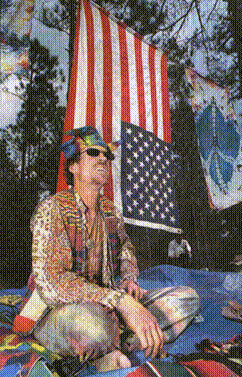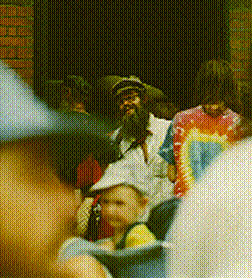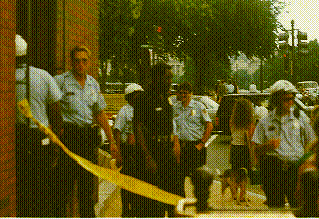
Rainbow Light calls on everybody to pray to Mother
Earth. Lifting a crystal above his head Rainbow Light
intones a prayer, "Thank you, Mother Earth, thank you,
Great Spirit," turning to the four directions. The crystal catches the light of the full moon, just rising above
the crest of the ridge amplifying it. The moonlight
seems to bloom in the crystal, taking over the night.
LATE IN THE AFTERNOON OF JULY 5, CICADAS
are ringing in my ears as I put my wedding and
family rings on the altar next to a medicine
pipe and crawl inside the sweat lodge with 15
other people. We sit with our feet to the stone pit. The
16 dogwood saplings there are tied so low that there is
barely room to sit up straight.
The sweat lodge is situated far downstream from the
rest of the gathering. I'm here at Diamond Dave's invitation; the sweat lodge is part of his wedding ceremony.
Felipe will conduct it, along with Green Light, a union
electrician from Northern California. Felipe and Green
Light explain that this lodge is being run in a traditional
Lakota way. We are reminded to pass along water and
prayer and pipe clockwise so as not to break the line
from the oven and the altar and let in unpure spirits.
They pass around osha root - bear medicine, Felipe
calls it - to help us with our breathing. Felipe tries to
reassure us that all of us can get through if we go
through this together.
Sweat is pouring off me, and my pulse is pounding
even before Generous Wolf pulls the rocks from the
oven with his long wooden fork and carries them into
the lodge. "Ho! Mitakuye oyasin " Felipe prays. "For all
our relations." The entrance is shut, and it is completely dark. Water splashes on the rocks, and burning steam fills the room. Prayers are offered up for the
wedding couple. Many minutes pass. Suddenly, I see
my own death coming toward me. I think I am dying.
I try to go toward the fear and panic, bolting for the
door. Green Light catches me, massaging my back as
I babble about my fears. I return to my place as the
first round ends after 20 minutes. A jug of water is
passed. More rocks are brought in. More burning
steam. When my turn comes, I moan out prayers to
Diamond Dave and his bride, praying with all the
knowledge of all the good in all the relationships that
I have ever known. Then I feel myself start to throw
up. I scramble clockwise around the pit and throw
myself out into the daylight.
Down on my hands and knees, I puke my guts out
over and over. It is a half-hour before I can crawl down
to Shoal Creek and fall in. What did I put myself
through this for? I think about something Robbie
Gordon said to me as we were driving east through the
Texas panhandle late at night a week before, great
swarms of insects splatting against the windsheild of our car.
"I'm not interested in money or fame or having a family," he
said. "I'm only interested in wisdom."
COME EVENING, IT RAINS, A HEAVY shower that leaves
evrybody's things soaked and sends many Rainbows scurrying for
their cars and vans and buses. You can't have Rainbows without
rain, people assure one another hopefully as they gather beneath
the tarp at Kid Village. The lack of an actual Rainbow sighting at
this year's gathering has been a source of constant speculation.
A Rainbow around the sun that appeared in a cloudless sky - after
the July 4th meditation two years ago at the Vermont gathering -
has been constantly recalled. People see the Rainbow as
affirmation of a good gathering and/or a good prayer.
With so many people fleeing the weather, the gathering turns
more intimate. Every year the Rainbow Gathering dedicates one
night to its "hipstory." Led by Garrick Beck, several hundred
Rainbows hunker down on the damp, straw covered earth and journey
through their collective past. "Who remembers 1972?" Beck calls
out, and one after another, year by year, Rainbows stand to
volunteer a tale about the hardships, the miracles, the
community, the visions. But Beck himself tells the crucial tale
of the visit to the 1977 Gathering, in New Mexico, by a nearly
blind Hopi "keeper of the prophecies," a medicine man named
Grandfather David.
The Rainbows were gathered on the North Fork of the Gila
River. One afternoon, Grandfather David stood in the blazing sun
and in a careful voice recited the entire Hopi history. "Some
people were rapt," Beck tells his listeners. "Other people's eyes
were glazing over. We were asking each other, 'What is he telling
us this for?' At the end of three hours, he thanked us for
listening and went back to his tepee.
"The evening of the same day," Beck continues, "the drums
had started up, and people were dancing, and a woman came out of
the tepee and said, "Gandfather David wants to know if he could
talk some more." We kind of went, "Oh, no," to ourselves. The
evening was just getting going, but, of course, we said, 'Sure.'
And that little old man came back out, supported by two people,
and he gave one of the most blazingly hair-raising political
speeches I ever heard. It was right up there with Martin Luther
King, Jr.'s speech at the Lincoln Memorial in '63. He said,
"Don't expect the banks, the corporations or the governments to
give you anything. They will never respect you unless you hold
territory. And defend it. For the Mother Earth."
This lesson is not lost on the next day's council of
Legaliasion. In 1976, Legaliasion came together as one of the
many volunteer groups in Rainbow, just like the parking lot
crews, the shitter diggers, and supply. But over the years, as
government pressure on Rainbow grew more sophisticated,
Legaliasion has become a more and more critical aspect of
Rainbow. Many of the best minds of the Rainbow Family, including
Garrick Beck, Mareba Jos, Robbie Gordon, Michael John, Red Moon
Song, Joanie Freedom, Badjer, Shiloh, Stephen Principle,
maveric(with a small m), Julia Moonsparrow and at least 50 more
circle together on a pine needle covered forest floor to take up
what is, perhaps, Rainbow's greatest challenge.
For 22 years, local, state and the federal governments have
been trying to stop the Rainbow Gathering. In 1987, North
Carolina police blocked a bridge that was the only entrance into
the gathering, forcing people to walk many miles to the site.
Before the Texas gathering, in 1988, the U.S. Attorney's office
in Lufkin attempted to get a court order in Lufkin to blockade
all the U.S. Highways leading to the gathering site. State police
commonly set up roadblocks on the roads leading into gatherings.
Since at least the mid-'80's, the Forest Service has been
trying to control the Rainbow Gathering with a series of written
regulations on "group use." But until now, the Forest Service
hasn't found a way to make them constitutional.
Now the Forest Service is trying again. A new set of
proposed amendments to the Forest Service regulations would
establish seven criteria for noncommercial group use of the
National Forests. These will allow the Forest Service to close
back-country areas in case of fire danger or inclement weather;
force groups to alter their arrival or departure times if the
times interfere with grazing or timber sale contracts; and shut
down activities that, in the Forest Service's judgement pose a
danger to public health by, for example, threatening
contamination of water supplies, insufficint sanitation
facilities or unsafe handling of food. Any gathering of more than
25 people would be forbidden without a permit. Violation of the
regulations could be punishable by six months in jail for
trespassing on the Public Lands or a $500.00 fine [or both].
Lyle Laferty, a 26-year veteran of the Forest Service, denies
that the new regulations are in any way directed against the
Rainbow, which he insists is no different from any other large
group of people using the national forests. "Last year, we had
over 700 million people use or visit the national forests," he
points out, although no group of visitors was remotely close to
the size of the Rainbow Gatherings, which often, especially when
held in the Western states, attract upwards of 25,000 people.
For the Rainbow Family, the crux of the problem with the
proposed regulations is that a person or persons, 21 years of age
or older, must sign a special group use authorization on behalf
of the applicant. Someone has to accept the responsibilities
associated with use of a national Forest. The Rainbows insist
that "No one person is responsible for the gathering," as one
anonymous Rainbow wrote in a leaflet handed out at the
gathering. "Each of us is responsible for ourselves, and legally
liable for our behavior as individuals. It is simply human nature
for folks to gather, and a natural human right to do so on public
land, so long as we are respectful to others and clean up our
site."
Legaliasion's discussion goes on for hours. Arguments
frequently grow contentious and personal; and legaliasion's
focalizer, a tall, handsome redheaded college speech teacher
named Sherby Jones, is frequently forced to shout out, "Focus!"
when things get too dispersed, several times asking people to
hold hands for a moment in a circle of silence.
At one point, a cop wearing a T-shirt marked ALABAMA
MARIJUANA ERADICATION CONTROL in big orange letters and an
Alabama State Trooper wander into the meeting. Thomas the Scribe,
a bearded, bespectacled bohemian in tie-dye, stands up.
 Thomas, who
is part of the Peace Park Tribe, which has been maintaining a 24-
hour-a-day peace vigil in Lafayette Park, across from the White
House, for the past twelve years, tells the cops, "There's a
council going on, and we're discussing the Forest Service
Regulations." Politely, but firmly, he asks them to leave. The
beefy policemen peer down at the slight scribe the way bears
might contemplate a particularly annoying fly. "We don't have any
trouble with that," the trooper drawls, and the two men turn and
strut away.
Rainbows tend to hold a fairly absolutist view concerning
the First Amendment and the "right of the people peaceably to
assemble." Peaceable assembly on public lands is a right, they
insist, not a "privilege" subject to government approval. As
maverick (with a small m), one of the main Bus Village
focalizers, puts it, "A freedom ain't a freedom unless the people
excercise it."
It will probably be the end of the year before Jim Lyons,
the assistant secretary at the Department of Agriculture (for
natural resources and the environment), finishes reviewing the
group use regulation, and his boss, the secretary of Agriculture,
Mike Espy, signs off on them. The Forest Service's Lyle Laferty
is taking a conciliatory posture. "Our position is that we want
to grant the permit."
I point out that the Rainbow Family doesn't have anybody who
can sign such a permit.
Laverty pauses, "It's a real interesting management
challenge," he says.
THE LAST DAY OF THE RAINBOW GATHERING is traditionally
dedicated to the Vision Council. The day starts with individuals
telling their ideas of what the future of the Rainbow Family
should be, and ends with the deciding of where the Family will
gather next. This year, the vision council winds up its business
quickly, establishing a consensus on Wyoming, including- with a
nod to the bioregionalists - the Uinta Mountains in Utah.
The cleanup following the gathering is "one of the easiest
yet," according to Mareba Jos, who is one of several hundred who
have stayed around to "re-naturalize" the site, to recycle the
garbage, dismantle all the ramps and bridges, scatter logs,
branches and leaves, and aerate stomped down parking lots and
paths. By the time the last Rainbows leave, those who want to
extract every last ounce of love and connection from the
gathering - or have nowhere to go - everything is reseeded with local
wildflowers (and a little pot).
Thomas, who
is part of the Peace Park Tribe, which has been maintaining a 24-
hour-a-day peace vigil in Lafayette Park, across from the White
House, for the past twelve years, tells the cops, "There's a
council going on, and we're discussing the Forest Service
Regulations." Politely, but firmly, he asks them to leave. The
beefy policemen peer down at the slight scribe the way bears
might contemplate a particularly annoying fly. "We don't have any
trouble with that," the trooper drawls, and the two men turn and
strut away.
Rainbows tend to hold a fairly absolutist view concerning
the First Amendment and the "right of the people peaceably to
assemble." Peaceable assembly on public lands is a right, they
insist, not a "privilege" subject to government approval. As
maverick (with a small m), one of the main Bus Village
focalizers, puts it, "A freedom ain't a freedom unless the people
excercise it."
It will probably be the end of the year before Jim Lyons,
the assistant secretary at the Department of Agriculture (for
natural resources and the environment), finishes reviewing the
group use regulation, and his boss, the secretary of Agriculture,
Mike Espy, signs off on them. The Forest Service's Lyle Laferty
is taking a conciliatory posture. "Our position is that we want
to grant the permit."
I point out that the Rainbow Family doesn't have anybody who
can sign such a permit.
Laverty pauses, "It's a real interesting management
challenge," he says.
THE LAST DAY OF THE RAINBOW GATHERING is traditionally
dedicated to the Vision Council. The day starts with individuals
telling their ideas of what the future of the Rainbow Family
should be, and ends with the deciding of where the Family will
gather next. This year, the vision council winds up its business
quickly, establishing a consensus on Wyoming, including- with a
nod to the bioregionalists - the Uinta Mountains in Utah.
The cleanup following the gathering is "one of the easiest
yet," according to Mareba Jos, who is one of several hundred who
have stayed around to "re-naturalize" the site, to recycle the
garbage, dismantle all the ramps and bridges, scatter logs,
branches and leaves, and aerate stomped down parking lots and
paths. By the time the last Rainbows leave, those who want to
extract every last ounce of love and connection from the
gathering - or have nowhere to go - everything is reseeded with local
wildflowers (and a little pot).
 Several hundred Rainbows proceed to Washington, where they
camp across the street from the White House in Lafayette Park and
demonstrate against a new Forest Service Regulations for the next
month. They delivered 600 letters and petitions with 22,000
signatures, to the department of Agriculture. On August 4, the
final day for comments on the new forest-use rules, 14
demonstrators are arrested inside the Agriculture Department
itself. Seated beneath a Rainbow Banner, praying and chanting,
they are arrested for unlawful entry and forced to sit handcuffed for 11 hours before they are booked.
One of those arrested is Julia Moon Sparrow. After she is
released, she and Matteo, her companion, move on to an American
Indian prayer ceremony. "We are endangered by these regulations,"
she insists, calling from a pay phone on the reservation. "It's
not just taking away our right to party. The Rainbow Nation is a
conscious choice to return to the traditional ceremonial ways.
But this America of European origin obviously doesn't recognize
the value of ceremony, they're going to try to stop us, because
we will always remain a threat."
Several hundred Rainbows proceed to Washington, where they
camp across the street from the White House in Lafayette Park and
demonstrate against a new Forest Service Regulations for the next
month. They delivered 600 letters and petitions with 22,000
signatures, to the department of Agriculture. On August 4, the
final day for comments on the new forest-use rules, 14
demonstrators are arrested inside the Agriculture Department
itself. Seated beneath a Rainbow Banner, praying and chanting,
they are arrested for unlawful entry and forced to sit handcuffed for 11 hours before they are booked.
One of those arrested is Julia Moon Sparrow. After she is
released, she and Matteo, her companion, move on to an American
Indian prayer ceremony. "We are endangered by these regulations,"
she insists, calling from a pay phone on the reservation. "It's
not just taking away our right to party. The Rainbow Nation is a
conscious choice to return to the traditional ceremonial ways.
But this America of European origin obviously doesn't recognize
the value of ceremony, they're going to try to stop us, because
we will always remain a threat."
CyberTrail -- OPTIONS===>>>


